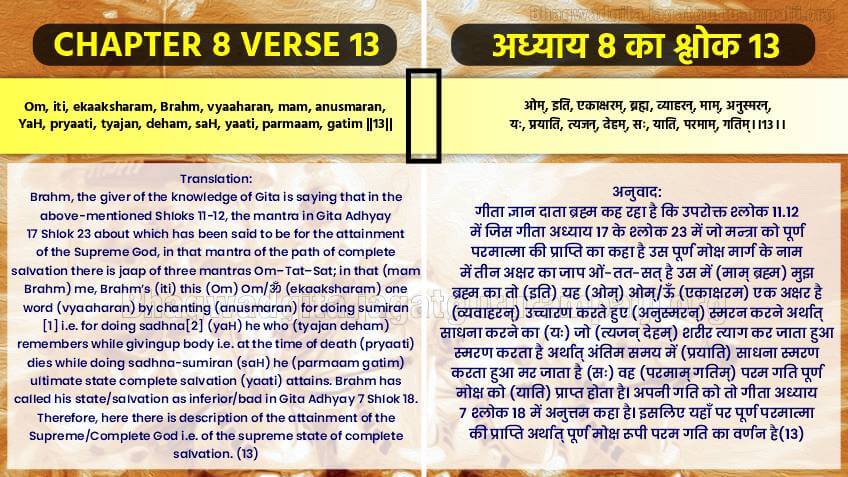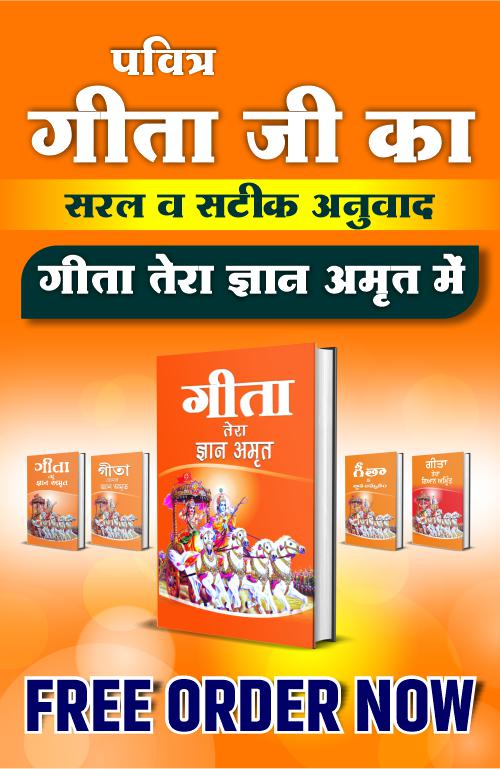
Om, iti, ekaaksharam, Brahm, vyaaharan, mam, anusmaran,
YaH, pryaati, tyajan, deham, saH, yaati, parmaam, gatim ||13||
Translation: Brahm, the giver of the knowledge of Gita is saying that in the above-mentioned Shloks 11-12, the mantra in Gita Adhyay 17 Shlok 23 about which has been said to be for the attainment of the Supreme God, in that mantra of the path of complete salvation there is jaap of three mantras Om–Tat–Sat; in that (mam Brahm) me, Brahm’s (iti) this (Om) Om/ॐ (ekaaksharam) one word (vyaaharan) by chanting (anusmaran) for doing sumiran[1] i.e. for doing sadhna[2] (yaH) he who (tyajan deham) remembers while giving up body i.e. at the time of death (pryaati) dies while doing sadhna-sumiran (saH) he (parmaam gatim) ultimate state complete salvation (yaati) attains. Brahm has called his state/salvation as inferior/bad in Gita Adhyay 7 Shlok 18. Therefore, here there is description of the attainment of the Supreme/Complete God i.e. of the supreme state of complete salvation. (13)
Translation
Brahm, the giver of the knowledge of Gita, is saying that in the above-mentioned Shloks 11-12, the mantra in Gita Adhyay 17 Shlok 23 about which has been said to be for the attainment of the Supreme God, in that mantra of the path of complete salvation in which there is jaap of three mantras Om–Tat–Sat; in that there is this one word ‘Om/ॐ’ for me, Brahm, for doing sumiran i.e. sadhna while chanting. He, who does sumiran / remembers while giving up his body i.e. dies while doing sumiran in the final moments, attains supreme state – complete salvation. {Brahm has called his state/salvation as inferior/bad in Gita Adhyay 7 Shlok 18. Therefore, here there is description of the attainment of the Supreme/Complete God i.e. of the supreme state of complete salvation.}
Meaning
Kaal God is saying that in that mantra of three words (Om, Tat, Sat), there is only one word Om/ॐ for me i.e. Brahm, which has to be chanted for doing sumiran. A devotee who while doing sumiran-sadhna unto last breath, gives up his body, he attains the supreme state i.e. salvation. {Brahm has called his salvation as (anuttamam) very inferior/very bad in Gita Adhyay 7 Shlok 18.
ओम्, इति, एकाक्षरम्, ब्रह्म, व्याहरन्, माम्, अनुस्मरन्,
यः, प्रयाति, त्यजन्, देहम्, सः, याति, परमाम्, गतिम्।।13।।
अनुवाद: गीता ज्ञान दाता ब्रह्म कह रहा है कि उपरोक्त श्लोक 11.12 में जिस गीता अध्याय 17 के श्लोक 23 में जो मन्त्रा को पूर्ण परमात्मा की प्राप्ति का कहा है उस पूर्ण मोक्ष मार्ग के नाम में तीन अक्षर का जाप ओं-तत-सत् है उस में (माम् ब्रह्म) मुझ ब्रह्म का तो (इति) यह (ओम्) ओम्/ऊँ (एकाक्षरम) एक अक्षर है (व्यवाहरन्) उच्चारण करते हुए (अनुस्मरन्) स्मरन करने अर्थात् साधना करने का (यः) जो (त्यजन् देहम्) शरीर त्याग कर जाता हुआ स्मरण करता है अर्थात् अंतिम समय में (प्रयाति) साधना स्मरण करता हुआ मर जाता है (सः) वह (परमाम् गतिम्) परम गति पूर्ण मोक्ष को (याति) प्राप्त होता है। अपनी गति को तो गीता अध्याय 7 श्लोक 18 में अनुत्तम कहा है। इसलिए यहाँ पर पूर्ण परमात्मा की प्राप्ति अर्थात् पूर्ण मोक्ष रूपी परम गति का वर्णन है(13)
केवल हिन्दी अनुवाद: गीता ज्ञान दाता ब्रह्म कह रहा है कि उपरोक्त श्लोक 11-12 में जिस पूर्ण मोक्ष मार्ग के नाम जाप में तीन अक्षर का जाप कहा है उस में मुझ ब्रह्म का तो यह ओं/ऊँ एक अक्षर है उच्चारण करते हुए स्मरन करने अर्थात् साधना करने का जो शरीर त्याग कर जाता हुआ स्मरण करता है अर्थात् अंतिम समय में स्मरण करता हुआ मर जाता है वह परम गति पूर्ण मोक्ष को प्राप्त होता है। {अपनी गति को तो गीता अध्याय 7 श्लोक 18 में अनुत्तम कहा है। इसलिए यहाँ पर पूर्ण परमात्मा की प्राप्ति अर्थात् पूर्ण मोक्ष रूपी परम गति का वर्णन है (13)}
भावार्थ: काल भगवान कह रहा है कि उस तीन अक्षरों (ओं,तत्,सत्) वाले मन्त्रा में मुझ ब्रह्म का केवल एक ओम/ऊँ (ओं) अक्षर है। उच्चारण करके स्मरण करने का जो साधक अंतिम स्वांस तक स्मरण साधना करता हुआ शरीर त्याग जाता है वह परम गति अर्थात् मोक्ष को प्राप्त होता है। {अपनी गति को अध्याय 7 श्लोक 18 में (अनुतमाम्) अति अश्रेष्ठ कहा है।}
[1] Rememberance of given mantra by repetition
[2] Worship / religious practice
